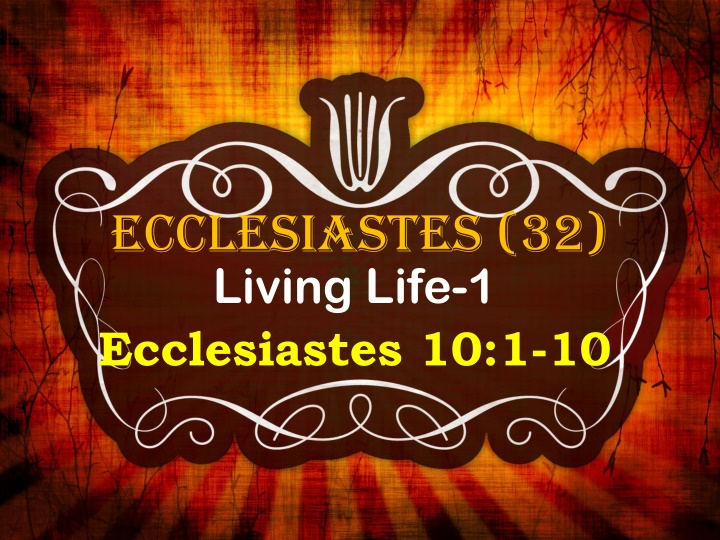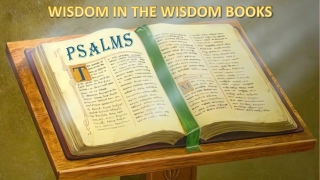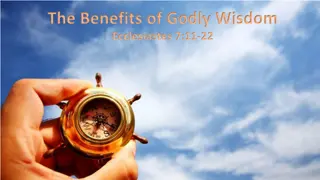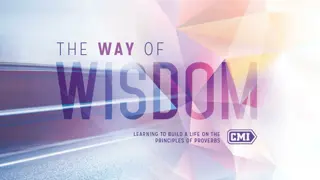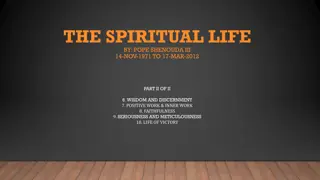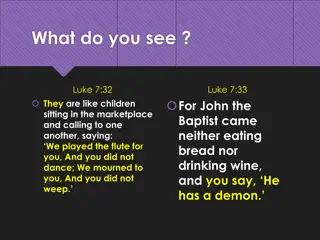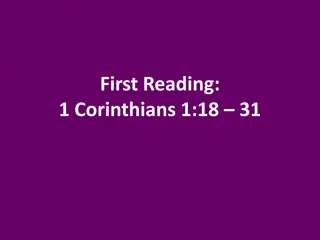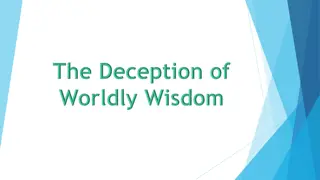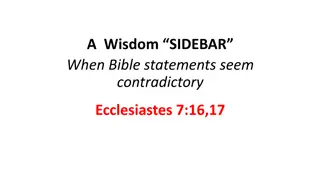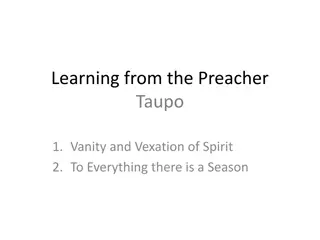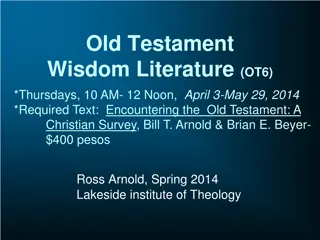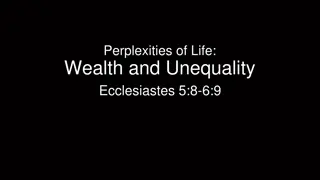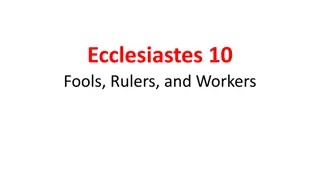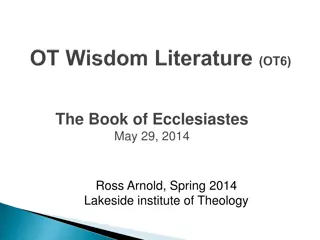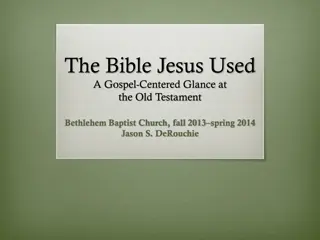Lessons on Wisdom in Ecclesiastes 10:1-10
Study the insightful lessons from Ecclesiastes 10:1-10 focusing on wisdom, actions, and consequences. Reflect on the impact of small follies and the importance of making wise choices to avoid ruin and preserve honor. Explore the significance of wisdom versus foolishness in one's actions and decisions, as illustrated through meaningful analogies and reflections in this section.
Download Presentation

Please find below an Image/Link to download the presentation.
The content on the website is provided AS IS for your information and personal use only. It may not be sold, licensed, or shared on other websites without obtaining consent from the author.If you encounter any issues during the download, it is possible that the publisher has removed the file from their server.
You are allowed to download the files provided on this website for personal or commercial use, subject to the condition that they are used lawfully. All files are the property of their respective owners.
The content on the website is provided AS IS for your information and personal use only. It may not be sold, licensed, or shared on other websites without obtaining consent from the author.
E N D
Presentation Transcript
Ecclesiastes (32) Living Life-1 Ecclesiastes 10:1-10
About this section We continue our study of the second half of Ecclesiastes, we are addressing numerous miscellaneous thoughts about wisdom. In this lesson we notice several more lessons related to living life with wisdom. This lesson is closest to Solomon s Proverbs short, wise sayings about life
Dead flies(10:1) Dead flies putrefy the perfumer s ointment (1) A dead fly can ruin a dish or a perfume. It can cause it to spoil and thus be wasted. How many dead flies would you allow in your bowl of soup?
Dead flies(10:1) Lesson: So does a little folly to one respected with honor and wisdom. IT only takes one misspoken word or foolish act to destroy a lifetime of good influence.
Dead flies(10:1) The point: Actions have consequences. Consider David. We can think of many examples of leaders whose one act of indiscretion becomes their legacy
A wise mans heart (10:2) A wise man s heart is in his right hand, a fool in his left Why right hand? Probably its usefulness for most dominant. Always been associated with wisdom, good, strength, and being reserved. The left had often associated with foolishness, poor decisions, weakness and reckless thinking.
A wise mans heart (10:2) Matthew 25:32-33 the sheep on the right, the goats on the left The point is that the wise and honorable thinks before he acts. His heart is good and reserved. The fool is the OPPOSITE reckless and unrestrained. Cf. Matthew 2:35
Even when a fool walks (10:3) He lacks wisdom, and shows everyone he is a fool. His actions so engrained he is recognized for who he is A disturbing trend social media where foolish behavior is applauded and even encouraged. Some make decisions that will follow them the rest of their lives piercings, tattoos, bad actions, social media posts, etc.
Even when a fool walks (10:3) The Bible speaks of who a fool is: Prov. 1:7, 22 they despise wisdom and knowledge Prov. 3:35 shame is their legacy Prov. 10:18 they spread slander Prov. 10:23 to do evil is like sport Prov. 12:13 right in his own eyes Prov. 12:16 his wrath is known at once Prov. 14:9 he mocks at sin Prov. 18:2 has no delight in understanding
Even when a fool walks (10:3) The Bible speaks of who a fool is: Furthermore: Romans 1:22-23 He professes wisdom and pursues idols Psalm 14:1 denies there is a God 1 Corinthians 1:18, 23 rejects and mocks the message of the cross
Do not leave your post (10:4) IF the spirit of a ruler rises against you (his temper rises) Rulers often become angry at those under them, and at times they rashly become angry
Do not leave your post (10:4) Solomon warned, Don t leave your post Do not abandon your position (NASB) Don t quit! While there is a time to walk away, there is also a time to stand your ground with calmness If you are calm, you are more likely to gain a hearing and explain your side. Remember, the fool acts rashly!
Do not leave your post (10:4) By remaining calm at least 3 things are accomplished: 1) You get the chance to reasonably defend yourself 2) Your post is not abandoned if you are essential , do leave a gap that is difficult for others to fulfill 3) Your reputation precedes you are you known as someone who quits at the first sign of trouble?
Do not leave your post (10:4) The wise think before they act. Proverbs 6:16-19, God hates feet that are swift in running to evil Proverbs 14:16, A wise man fears and departs from evil, but a fool rages and is self-confident Proverbs 19:2, he who sins hastens with his feet Prov. 21:5, the hasty leads to poverty Prov. 29:20, more hope for a fool than one hasty with his words
Folly set in great dignity (10:5-7) Evil under the sun Error proceeding from a ruler Foolishness set in positions of dignity, while the wealthy (successful) are silenced Servants on horses, while princes are walking The point is NOT about elevating one deserving. This is about foolish placements
Folly set in great dignity (10:5-7) The point: Foolish decisions have consequences. How many chose the unqualified or less qualified for some self-serving or social reason? Nepotism, etc. The result is often a less productive or even disastrous outcome. Consider Rehoboam 1 Kings 12:10 Proverbs 19:10, Luxury is not fitting a fool
Anticipate the unforeseen (10:8-9) Solomon here gives 4 examples: - one digging a ditch and falls in - one breaking through a wall and is bitten by a serpent - one quarrying rock and is hit - one who splits wood and is injured by it
Anticipate the unforeseen (10:8-9) As we live our lives, we must always anticipate problems and the unexpected. ALSO, we need to exercise caution and safety True physically a wise worker takes precautions to limit the possibility and extent of accidents. Spiritually we need to be cautious. Remember the warning of Jesus to His apostles in Matthew 10:16, Also Colossians 4:15
Anticipate the unforeseen (10:8-9) NOTE: Sometimes vs. 8 is seen as one scheming and caught in his own traps. While this is certainly something that is true (Psalm 7:14-16, cf. Matthew 15:12-14) the better reading in our context is the warning to be cautious and act with wisdom
A dull ax (10:10) Still dealing with wisdom. This illustration notes that working with a dull ax requires one to use more strength more difficult to accomplish the task But the wise will bring success they take the time to sharpen the ax and save time in the long run (or find some other way to accomplish the task)
A dull ax (10:10) Lesson: How many times in life do we make a situation more difficult because we do not plan from the beginning? How many waste time because they don t read the directions either assembling furniture or a recipe?
A dull ax (10:10) Spiritually, if we want to be effective in serving God AND reaching others we need to prepare! READ THE DIRECTIONS 2 Timothy 2:15, 2:21
Do you think before you act? Ecclesiastes 12:13-14
